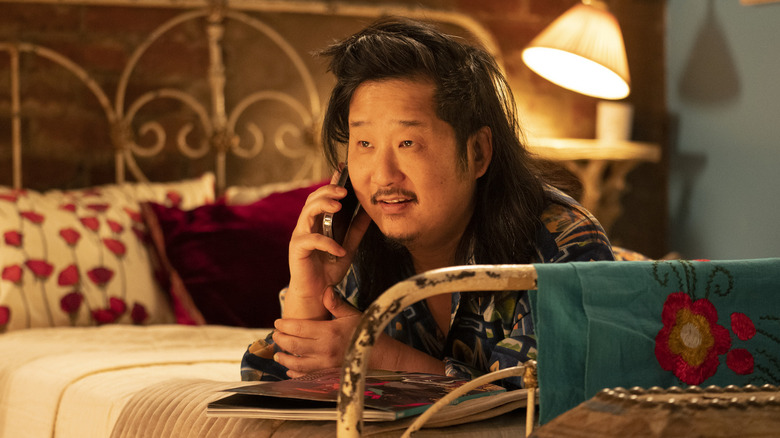Why We Never See TV Characters Say Goodbye Before Hanging Up The Phone
Sometimes screenwriters use realism in scripted television to highlight the humor of everyday situations (see: "Seinfeld"). Other times, realism dramatizes a work environment like in "Grey's Anatomy," or it offers a window into a specific high school experience with universal appeal — as we see in how "Never Have I Ever" tackles teenage romance. But it's rarely—if ever—a completely accurate depiction of real life. Pregnancy plotlines aside, people rarely go to the bathroom on television. How do sitcom characters drive safely while looking at their passenger rather than the road? When they make plans over the phone to meet up, why do they always leave out logistical details like where and when they're going?
In particular, there's something television characters often do that's rude. They regularly fail to say "goodbye" when ending a phone call. Instead, they hang up and move along with their day! We had to know what that was about, so we researched what screenwriters had to say on the matter.
Time constraints are real—even in the fictional world!
Dialogue in television shows has a lot of work to do with limited time. Conversations move the plot along and define characters and their dynamics. Depending on the show, dialogue heightens tension, builds suspense, provides information, adds humor, and pulls at viewers' heartstrings. If you were reading a book, you might notice the author can do without dialogue, opting for long paragraphs of description instead. But television—a visual and aural medium—is generally dialogue-heavy, aside from the occasional montage or silent scene.
Additionally, dialogue enhances a show's realism across television genres. Even in the animated fantasy "She-Ra and the Princess of Power," conversations carry stakes. Chats between characters are supposed to make a scripted show feel more realistic. If that's true, then why do scripts pass over the chance of having characters say goodbye before hanging up on a friend?
The truth is real life is much different from television in a critical way. If we're going to get existential for a moment, real people and fictional characters have limits on their time. But while we cycle through life in 24-hour blocks, television characters have less time to show days worth of action. Many shows get only 23 minutes to tell their story, so that doesn't leave much time for goodbyes.
Let's face it--realistic dialogue is wordy
Have you ever heard dialogue described as "shoe leather"? According to screenwriter Michael Jamin, this is how those in the business talk about lines that add realism without also adding entertainment value. You're not giving viewers a laugh, making them cry, or even advancing the plot. You're just making the characters sound more like real people or vampires — if we're watching a show like "Legacies." When it comes to the script's length, Jamin noted, "We have to turn in a cut to the network—let's say 22 minutes. They won't accept 22 minutes and 30 seconds."
With this in mind, he'll write long so they can shoot 25 minutes and then trim it down to pick up the show's pace. There will always be scenes that aren't so great and could benefit from the edit. "The first two or three minutes are easy to cut, but that last minute is hard," he said. "If I cut the guy saying, 'goodbye,' maybe I get to keep my favorite joke. Eventually, you get to the point where you're not even writing 'goodbye' into the script, knowing from experience that you're just going to cut it later."
So whether or not to write-in a goodbye in a script is a production-level decision. Would the show benefit more from a dash of realism or a hit of humor? Currently, the trend today is to ditch wordy realism in favor of more entertaining moments.


